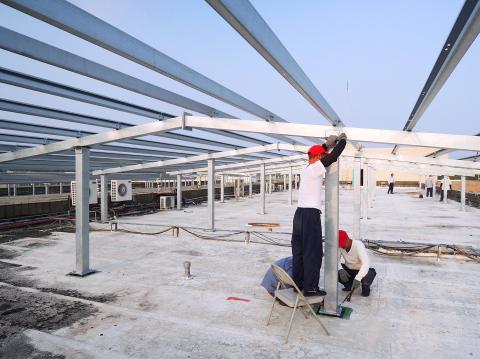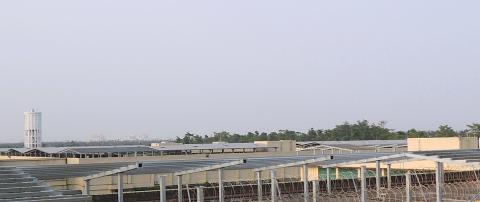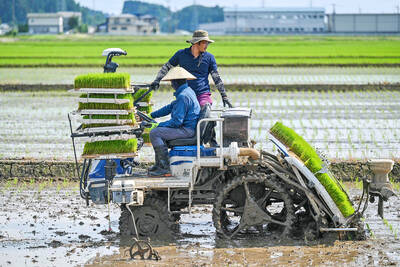Taiwan’s first renewable energy prison is set to begin generating power this year, with an estimated capacity of one million kilowatt-hours (kWh) per year. Pingtung Prison, which has decided to harness the county’s plentiful sunlight by installing solar panels on its roof, is expected to not only increase its revenue by selling solar power, but also to be able to cool the building in the summer.
The prison has signed a 20-year contract with a solar power company to build solar panels which would cover its roof of more than 10,000 square meters. The project is expected to be completed before March. Parts of the roof where solar panels have already been installed will begin generating power first.
The solar power project is expected to bring many benefits. In addition to increasing the government’s revenue, the solar panel can help lower inside temperatures by two to three degrees Celsius. Furthermore, the inmates can learn to install and maintain the solar power facilities and get paid for their work.

Photo: Lee li-fa, Liberty Times
照片:自由時報記者李立法
Since Pingtung Prison is the first prison in Taiwan to use green energy, the Agency of Corrections will evaluate the performance of its solar power project and introduce the project to other prisons and detention centers in Southern Taiwan. While Penghu Prison is to carry out a similar solar power project, Pingtung Detention Center is also planning on issuing an invitation to tenders to develop renewable energy at the center.
(Liberty Times, translated by Tu Yu-An)
全台第一座綠能監獄屏東監獄今年開始發電,可年產一百萬度電,獄方運用屏東日照資源架設屋頂型太陽能板,除售電增加財源,還有助於舍房夏日降溫。

Photo: Lee li-fa, Liberty Times
照片:自由時報記者李立法
屏監與太陽能公司簽約二十年,在超過一萬平方公尺面積的屋頂架設太陽能板,今年三月前可全部完工,已架好的樓層陸續產電。
除增加政府收入,屋頂太陽能板可以在夏日發揮舍房降溫效果,減少二至三度室溫,太陽能發電設施的維護及施工,也提供受刑人工作增加收入及學習技能機會,一舉數得。
屏東監獄是全台首座綠能監獄,矯正署評估後將在南台灣各監所推廣,澎湖監獄已比照辦理即將投入太陽能發電,屏東看守所也計劃招標發展綠能。
(自由時報記者李立法)

Rice is essential to Japanese culture, tradition and politics. People take pride in the oval-shaped sticky Japonica grain, which is still a staple even though total consumption has fallen over the decades. But since last summer, prices have soared as supplies have fallen short of demand. The government has long paid farmers to cut back on rice acreage, and change to other crops to keep rice prices relatively high. To cope with shortfalls this year, the government has released rice reserves. But the grain has been slow to reach supermarket shelves. Anger over that was part of the reason the Agriculture Minister

Step into any corner of Turkiye, and you’ll likely encounter the iconic “Evil Eye,” known as “nazar boncu?u” in Turkish. This striking blue glass ornament is shaped like an eye with concentric circles of dark blue, white, and light blue. While its name in English suggests something threatening, it’s actually a charm designed to ward off misfortune. The origins of the nazar boncu?u can be traced back to ancient Mediterranean and Middle Eastern traditions. The word nazar comes from Arabic, meaning “gaze,” while boncu?u translates to “bead” in Turkish. Central to the nazar boncu?u’s mythology is the idea that

A: Wow, Les Miserables Staged Concert Spectacular is visiting Taiwan for the first time. B: Isn’t Les Miserables often praised as one of the world’s four greatest musicals? A: Yup. Its concert is touring Taipei from tonight to July 6, and Kaohsiung between July 10 and 27. B: The English version of the French musical, based on writer Victor Hugo’s masterpiece, has been a huge success throughout the four decades since its debut in 1985. A: The musical has never toured Taiwan, but going to the concert sounds like fun, too. A: 哇,音樂劇《悲慘世界》紀念版音樂會首度來台巡演! B: 《悲慘世界》……它不是常被譽為全球四大名劇之一嗎? A: 對啊音樂會將從今晚到7月6日在台北演出,從7月10日到27日在高雄演出。 B: 這部法文音樂劇的英文版,改編自維克多雨果的同名小說,自1985年首演以來,在過去40年造成轟動。 A:

1. 他體力很弱,不能幹重活。 ˇ As he was weak in health, he could not do heavy work. χ Weak as he was in health, he could not do heavy work. 註:as 作連接詞,表示“因為”時,絕不能倒置,習慣上以 as 引導的 詞序倒置的從屬句是用來強調兩種意義相反的情況。例如: Strong as he was, he could not lift that rock. (儘管他的身體壯,他還是舉不起那塊石頭。) Weak as he was, he lifted that rock easily. (儘管他身體很弱,他還是能不費力地舉起那塊石頭。) 2. 在開發中國家,許多婦女就這樣悲慘地喪命。 ˇ In developing countries there are many women who lost their lives in similar tragic ways. ˇ There are many women in developing countries who lost their lives in similarly tragic ways. χ There are many women who lost their lives similarly tragic ways in developing countries. 註:錯句中把 in developing countries 放在限定性形容詞子句之末,易使人誤解為修飾 lost their lives,因此應放在句首或緊接修飾的對象。 3. 在極權國家,統治者什麼都有,老百姓什麼都沒有。 有。 ˇ In